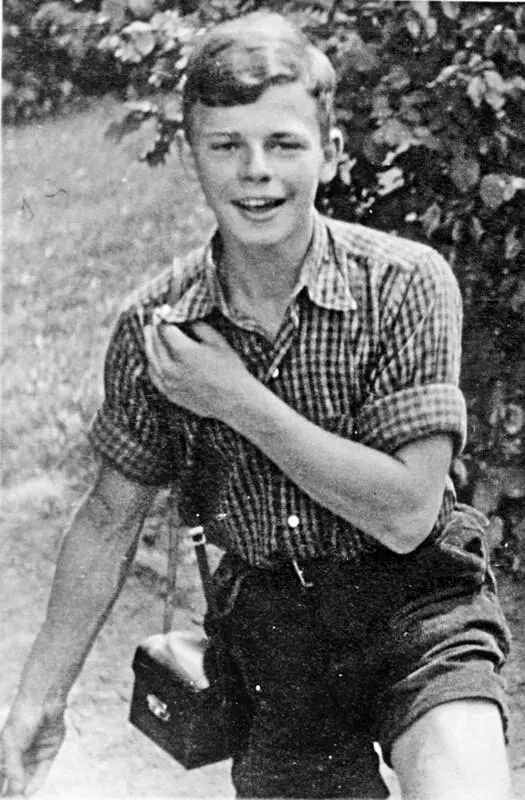Werner’s mother said Papa was in Amsterdam that very day, making final arrangements, and he would return to Berlin by Sunday. On the Friday of the following week, she and the two younger boys were to leave Germany, quite legally, as tourists visiting Amsterdam. They would each carry only the allowable ten marks. The next day, Werner was to fly with his father from Berlin’s Tempelhof Airport to Amsterdam, taking only carry-on baggage, so as not to arouse suspicions. A few days later, a Jewish moving company would empty out the apartment and ship their furnishings to them in Holland.

Werner Angress, sixteen, at Gross Breesen, 1936. (Family photograph)
Werner’s first inclination was not to join his family on their desperate journey. He had already discussed with Bondy the possibility of settling elsewhere with friends from Gross Breesen—perhaps even in America, where Bondy was talking about setting up a new agricultural training operation. Werner told his mother he didn’t want to wait around for his father to return, that he needed to get back to Gross Breesen. He left soon after for the railroad station, where he caught the next train.
When he arrived back at the farm, Werner told Bondy of his father’s audacious escape plan and his own desire to stay at Gross Breesen. Bondy didn’t say anything as Werner spoke. When he finished, Bondy explained that he was going to Berlin the next day, and that they would speak upon his return.
Two days later, Bondy called Werner into his office. He had spoken with colleagues in Berlin, and they had all agreed it would not be possible for Werner to stay at Gross Breesen after his parents fled Germany. The authorities would soon learn that his father had taken their money out of the country; they would most likely arrest Werner and hold him until his father returned to face criminal charges. That could put the entire Gross Breesen program in danger.
Bondy’s next news sent a jolt of surprise through Werner. He had met with Ernst while in Berlin, Bondy said. He advised the conflicted young man to do what his father expected of him. Ernst understood Werner’s feelings about Gross Breesen and promised to consider any future settlement plans. Given all that was happening, Bondy said Werner could hardly expect more generosity from his father. For his part, Bondy promised to include Werner in any plans for a new agricultural settlement in the United States or elsewhere.
Werner realized that Bondy was right. He had reacted like an impetuous teenager. If his father felt so strongly that the family needed to get out of Germany, the danger must be great indeed. In such perilous times, he belonged with his family.
On Friday, October 29, 1937, Werner took an overnight train to Berlin, where he met his father at the station café. They embraced warmly, and over a quick breakfast, his father calmly explained that Mutti and the two boys, Fritz and Hans, had left the day before and were now safely out of the country.
What Ernst did not tell his son—for Werner’s own good, in the event that he was questioned—was that a young German woman had arrived that morning at their apartment with an empty briefcase. She was there to pick up the currency Ernst had brought home from the bank the night before and hidden under his mattress. Together, they packed a hundred thousand bundled-up Reichmarks (then worth about forty thousand U.S. dollars) into the briefcase.
Ernst had offered the young woman money for a taxi, but she demurred; taxis, she told him, could get into traffic accidents. It would be better if she took a streetcar to the train station. And then she was gone. After turning over his family’s entire life savings to a complete stranger, Ernst wasn’t sure whether to laugh or cry. But it was done; there was no turning back. The money-smuggling operation, which was based in Amsterdam, would receive 10 percent of whatever currency made it there. True to his upstanding character, Ernst had withdrawn only his own money and left the bank’s other deposits untouched.
From the café, Werner and his father took a taxi to Tempelhof Airport in south Berlin. Werner had all his clothes and about a dozen books stuffed into two suitcases, while his father carried a small bag suitable for a short trip. At the airport, which had four or five departure gates, Werner followed his father. At their gate, his father showed their airplane tickets to two men wearing long trench coats and derby hats, which everyone knew was the favorite attire of Gestapo agents, who were now closely monitoring all modes of transportation out of Germany.
Asked the purpose of their trip to Holland—they both had valid passports that bore the red “J”—Ernst said he was taking his son to Amsterdam, where Werner was to enroll in special agricultural training. The Gestapo men searched his bag, then allowed Ernst to pass through. After Werner’s bags were searched, he joined his father in the waiting area.
Before they sat down, they heard an announcement over the terminal’s loudspeaker: the plane for Amsterdam had been unable to take off from Dresden due to heavy fog. Passengers bound for Amsterdam could either wait until the next day’s flight or take the train that night.
Flights were departing from other gates for Copenhagen and Paris. Ernst knew it would look suspicious if they suddenly changed their destination to Denmark or France. They had given the Gestapo agents a specific reason why they were traveling to Holland.
“We’ll take the night train to Amsterdam,” he told Werner.
Since the train did not leave until midnight and it was now only noontime, they had a long wait. During their time together, Werner learned more about what had finally compelled his father to get the family out of Germany. New restrictions on Jews were being enacted all the time, he said, including the confiscation of their properties and assets. Germany was witnessing the “gradual strangulation of Jewish businesses.” Ernst feared that sooner or later there would be no opportunity for carrying on business and no way for him to make a living. Under the Nazis, he feared the family would eventually end up paupers with no place to go.
After sitting in a neighborhood café for a while, his father suggested they go see a movie. Dragging their bags along, they took a taxi to the cinema and settled into seats for a film, which was preceded by a newsreel entitled “Papi’s Fortieth Birthday.” It turned out that “Papi” was Joseph Goebbels, who had just turned forty. He was shown celebrating with his wife, Magda, and their young children, who presented bouquets of flowers to the beaming Nazi propaganda minister.
It was all too much for Ernst. He whispered to Werner that he should stay and watch the movie; they could meet afterward at the nearby apartment of his good friend Leo Gerson, to whom he wished to say good-bye.
Werner decided it was a good thing his father had left. The movie was about police chasing bank robbers in Amsterdam.
A surprise awaited Werner when he reached Leo Gerson’s apartment. Before he’d even had time to take off his jacket, his father told him there’d been a change of plans. Werner was to take a taxi to the train station and board the sleeping car, on which his father had reserved a private compartment. Once there, he would tip the conductor two Reichmarks and tell him that his father had been delayed in Berlin on business and wouldn’t be making the trip.
“I am to go to Amsterdam alone? What do you plan to do, Papa?”
“I don’t know yet,” Ernst answered.
His father said only that they would meet up in Amsterdam, and hurriedly sent Werner on his way with money for expenses. Shortly after Werner left, Ernst went to the same railway station, but to a different platform, and took a train heading in the opposite direction. He had a plan, of course, but had thought it was best for them both if he kept Werner in the dark. Ernst had also decided it was safer for them to travel apart. As he’d expected them to be on that morning’s flight to Amsterdam, he had advised his longtime secretary, Else Radinowsky, and the bank’s owner, Leo Königsberger, to report the missing funds to police that afternoon, so they wouldn’t be suspected as co-conspirators. When the flight to Amsterdam was canceled, Ernst had decided against contacting either his secretary or the bank’s owner, for fear of their becoming entangled in his crime. By now, they had likely notified police that the missing Jewish director of the Königsberger and Lichtenhein Bank had withdrawn all of his personal capital and was apparently fleeing the country. If that was the case, the authorities would try anything they could to stop him.
Читать дальше













